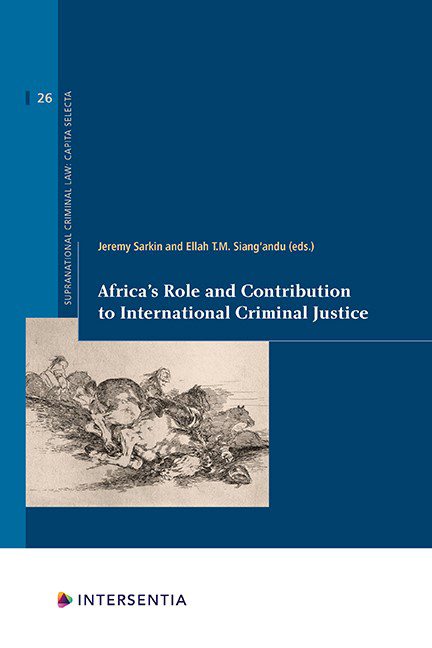Book contents
- Frontmatter
- Acknowledgements
- Contents
- List of Contributors
- Introduction: Understanding the Meaning, Context, Role and Importance of African Criminal Justice on the Continent and Beyond
- Types of International Criminal Courts in Africa
- The Extraordinary African Chambers in the Senegalese Courts and the Development of International Criminal Law in Africa
- The Use of International Criminal Law in African Countries
- The Nuremberg Principles in the Context of Africa: The Theory and Practice of Individual and Corporate Criminal Responsibility
- The Application of Universal Jurisdiction in Africa
- African Victims of Mass Atrocities Before Domestic Jurisdictions and the International Criminal Court: Bargaining for Justice
- The Role of the International Criminal Court in Africa: The Epic Fails?
- Is the African Court on Human and Peoples’ Rights with Criminal Jurisdiction an African Solution to an African Problem?
- Head of State Immunity in the African Context
- Index
African Victims of Mass Atrocities Before Domestic Jurisdictions and the International Criminal Court: Bargaining for Justice
Published online by Cambridge University Press: 11 February 2021
- Frontmatter
- Acknowledgements
- Contents
- List of Contributors
- Introduction: Understanding the Meaning, Context, Role and Importance of African Criminal Justice on the Continent and Beyond
- Types of International Criminal Courts in Africa
- The Extraordinary African Chambers in the Senegalese Courts and the Development of International Criminal Law in Africa
- The Use of International Criminal Law in African Countries
- The Nuremberg Principles in the Context of Africa: The Theory and Practice of Individual and Corporate Criminal Responsibility
- The Application of Universal Jurisdiction in Africa
- African Victims of Mass Atrocities Before Domestic Jurisdictions and the International Criminal Court: Bargaining for Justice
- The Role of the International Criminal Court in Africa: The Epic Fails?
- Is the African Court on Human and Peoples’ Rights with Criminal Jurisdiction an African Solution to an African Problem?
- Head of State Immunity in the African Context
- Index
Summary
INTRODUCTION
On 8 June 2018, the Appeals Chamber of the International Criminal Court (ICC) rendered an acquittal verdict in favour of Jean-Pierre Bemba Gombo, the founding leader of the Movement for the Liberation of Congo (MLC), an armed movement turned political party in the Democratic Republic of the Congo (DRC). Bemba had been previously convicted on 21 March 2016 by a Trial Chamber for his command responsibility for crimes allegedly committed by a contingent of his subordinates deployed in the Central African Republic (CAR) at the request of the then sitting President Ange-Felix Patassé to fend off an armed insurgency. He was found guilty on counts of murder and rape as both crimes against humanity and war crimes. He was also found guilty of pillaging as a war crime, and was sentenced, three months later, to 18 years’ imprisonment. The Appeals Chamber acquitted him on the grounds that the Trial Chamber had erred in establishing his command responsibility through a failure to take ‘all necessary and reasonable measures in response to MLC crimes in the CAR’. The Appeals Chamber concluded that Bemba could not be held liable because ‘one of the elements of command responsibility under article 28(a) of the Statute was not properly established’. Just as Bemba's earlier conviction was widely celebrated by victim rights advocates as a ‘historic step forward for victims’, particularly victims of sexual violence (Clark 2016), his acquittal was, predictably, denounced as an ‘affront’ to victims, particularly to the 5,229 victims who participated in ICC proceedings instituted by the prosecution against him.
The ICC verdict in the Bemba case concluded a long chapter of criminal judicial proceedings instituted in the domestic courts of the CAR against Bemba and other actors involved in the conflict. Proceedings in the CAR against former President Patassé and others, including Bemba, for crimes committed during the 2002/2003 period of protracted conflict in the country were initiated in 2003. However, political manoeuvring and local sensitivities involved in prosecuting high-profile political actors still enjoying some level of popular backing in a polarised context resulted in a discontinuation of domestic proceedings followed by a referral of the CAR situation to the ICC by the new administration led by François Bozizé (Carayannis 2015: 258–262).
- Type
- Chapter
- Information
- Africa's Role and Contribution to International Criminal Justice , pp. 155 - 190Publisher: IntersentiaPrint publication year: 2020



